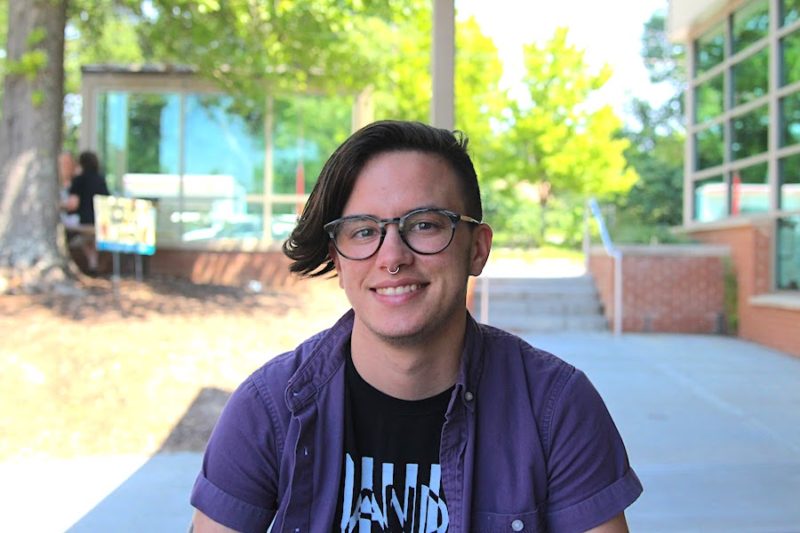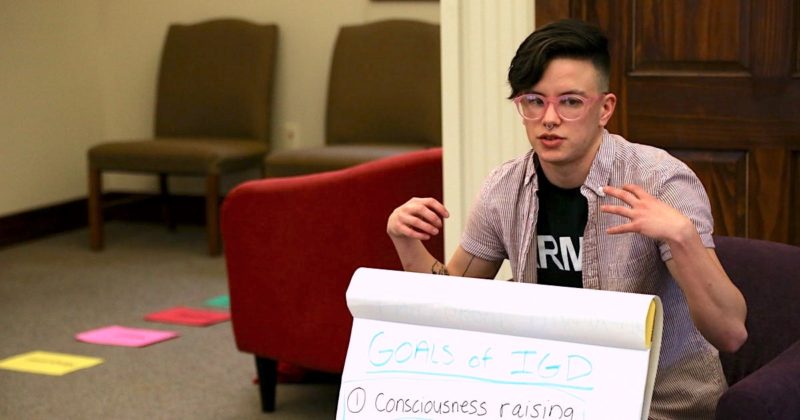
Jess Mcdonald joined CEF’s Durham team as Advocate Program Coordinator in June of 2017, and we are so thankful for them!
What made you interested in CEF?
I heard about the Advocate Program Coordinator position opening at CEF, and it seemed like the organization’s values, analysis, and visions of change aligned with my own. I’m really interested in doing social justice work that addresses both the day-to-day experiences of individuals and the larger systems that perpetuate inequalities. I’m passionate about doing this work in the South and in my home state of North Carolina in particular. Durham is where I want to plant my roots, and it’s where I’ve found a really strong community of people who are engaged in social justice work. The city has a really rich history, and so many of the struggles today around affordable housing and other issues are deeply connected to this history. I also have a background in social justice education with college students, and I’m really interested in bridging the town and gown divide between Durham and Duke in intentional ways. CEF really brings together several of my passions, and I’m so excited to be joining the team.
Why do you feel connecting with people is so important?
I feel like life, at its essence, is about connecting with people. Especially within social justice work, it’s all about the relationships we form within communities. So often the systems of power, privilege, and oppression are set up to prevent us connecting on a deep level and building that solidarity across difference. Transforming the world starts with transforming ourselves and our relationships with each other. Changing communities starts with one-on-one connections
My relationships with other people are what keeps me grounded and what reminds me why I do this work. We aren’t doing this work in a bubble, and it has real impacts on real people. In that way, connecting with people is also about accountability. Getting feedback about where we’re falling short, where we can grow, and what we need to be thinking more intentionally about is critical to doing meaningful work. Building that trust and communication is all based on relationships.
Tell us about your background
I’m from the coast of North Carolina, Morehead City. It’s a pretty small town. I went to Elon University, which is about 40 minutes from Durham, and I got involved in social justice work as a student there. When I was in college, I would come to Durham occasionally, and I also had friends from Durham. I studied history and sociology, and I did an undergraduate thesis about the history of LGBTQ life at Duke and UNC, so I spent a summer living in Durham and working in the archives in the Center of Gender and Sexual Diversity at Duke. After school, I worked at an LGBTQ non-profit that served college students across the country. After a year or so of working there, I went to grad school at UMass Amherst and got a degree in Social Justice Education, with a focus on intergroup dialogue. I came back to Durham for a little over a year, taught at NC Governor’s School for a couple of summers, and then spent the past year in a fellowship in Asheville. I worked at Our VOICE, a rape crisis center, assessing their services and making suggestions for how they could better serve the LGBTQ community. That was a year-long position that just ended, and I really wanted to come back to Durham, so I’m glad I found CEF.
What inspires you?
It may sound corny, and I feel like I keep talking about social justice, but seeing people coming together for a common cause in hard times like the ones we’re in is very inspiring to me. Whether that’s in response to things like HB2, police violence, gentrification, etc., seeing people come together and fight back against these systems is really inspiring. If you think about it, we are really resilient and powerful people, and getting together with folks to remind ourselves of that is really important for sustaining this work. I also look to history for inspiration, especially social movement ancestors like Leslie Feinberg or Audre Lorde or Marsha P. Johnson. To see yourself as part of that arc of history and understand that the generations that come after us will continue this work is really humbling.
What do you think will be your greatest challenge?
There’s just so much work to do in Durham in general, and at CEF, too. The city is changing so quickly, and we need to be one step ahead in making that growth sustainable for everyone, especially when it comes to affordable housing. Managing all of the Advocates and working to be as efficient as we can with our time, while also centering the importance of building meaningful relationships throughout the organization, is going to be a challenge, but I’m excited to take it on.
What projects are you excited about right now?
I’m really excited to co-teach the house course at Duke this fall. It’s been a year or so since I’ve been in a classroom, and I miss it. I’m kind of a nerd when it comes to pedagogy and facilitation. I love creating spaces for people to explore new topics and have critical conversations that they may not get to have in other parts of their lives. I guess it goes back to the idea of consciousness raising and transforming ourselves in order to transform the world. It’s a lofty goal, but we’ve got to start somewhere. The house course seems like a really amazing opportunity to combine social justice education, community-based work, and structured time for continued reflection to inform that work.




No comments yet.